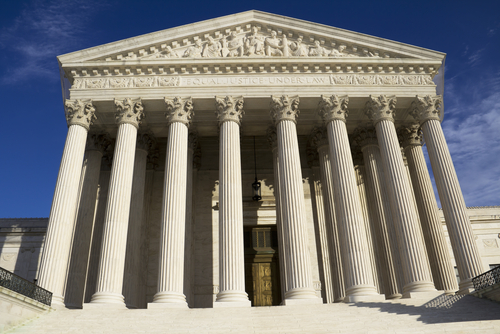Special from SHRM’s Employment Law and Legislative Conference
Hobby Lobby is the case to watch on this session’s Supreme Court docket, says noted author Jeffrey Toobin. Individuals have religious freedom, of course, Toobin says, but do corporations?
 |
Hobby Lobby is a large (3 billion plus) privately held organization with over 600 stores across the country. The company’s philosophy is imbued with the religious views of its founder David Green. For example, the number one operating principle listed on their website is “Honoring the Lord in all we do by operating the company in a manner consistent with biblical principles.”
Toobin, author of Too Close to Call, The Nine, and The Oath, offered his insights at the SHRM Employment Law and Legislative Conference, held recently in Washington, D.C.
HR budget cuts? Let us help. HR.BLR.com is your one-stop solution for all your HR compliance and training needs. Take a no-cost, no-obligation trial and get a complimentary copy of our special report Critical HR Recordkeeping—From Hiring to Termination. It’s yours—no matter what you decide.
Hobby Lobby, Toobin explains, maintains that complying with certain aspects of the Affordable Care Act would require it to violate tenets of its religious beliefs. Specifically, the company believes that certain types of birth control, e.g., the morning-after pill, constitute abortion, which, they say, is contrary to their beliefs as Christians.
Toobin says that the case, which was argued this week, will be interesting to follow because of two characteristics. First of all, there is the question of whether an organization’s religious beliefs can trump federal laws. And then second, the justices will have to decide the prickly issue of whether the objectionable treatments do constitute abortion. witchcraft love spells
Toobin’s Supreme Court Humor
While we wait for the decision in Hobby Lobby, Toobin offers two bits of Supreme Court humor:
Justices Souter and Breyer are often mistaken for each other, says Toobin. Once, when Souter was driving to New Hampshire, he stopped at a diner and a patron said, “I know you. You’re on the Supreme Court. You’re Stephen Breyer. Not wanting to embarrass the patron, Souter said, “Yes, I am Stephen Breyer.” “What’s the best thing about serving on the Supreme Court?” the patron asked him. Souter replied, “The privilege of serving with David Souter.”
Toobin on Bush v. Gore
When Toobin was writing his book about Bush v. Gore (Too Close to Call), he wanted to interview Gore but was unable to do so. Later, he met Gore and said, “I think I’m the number one Bush v. Gore junkie anywhere. Gore responded, “You might be number two.”
Stay tuned for the outcome of Hobby Lobby.

Ugh! to both jokes.
This is a seminal case that also challenges the following whether a “corporation” is considered a “person” thus allowed to have its religous beliefs protected under the Constitution.
Legally, the Justices are really going to have to struggle with this case since their decision will undoubtedly have long term consequences not only in its application to the Affordable Care Act; but other legislation that may inpinge on a corporation whose owners’ religious beliefs are in conflict with the legislation being enacted.
I was under the impression that it is illegal to favor one candidate over another yet it appears that companies which appear to believe their owners’ religious beliefs define their company must be doing just that. If you work for Hobby Lobby, you surely have to be a conservative Christian who doesn’t believe in birth control or abortion so would not want those benefits offered to you. In the real world, however, Christian candidates cannot be favored over others (I believe it’s called discrimination) so the employee population obviously includes all religions, including atheists and agnostics. It may be that these employees do want this type of coverage or are we expected to go along with the specious argument that the owner’s beliefs trump everything? Hardly freedom of religion.
I am very interested to see where the Supreme Court will land on this matter. It is noteworthy to me that the federal government has, for many years, at least a couple of decades, restricted abortion coverage under the Federal Employee Group Health (FEGHB)insurance. That is, federal employees’ health insurance plans were specifically prohibited from providing any benefits to pay for abortions. Currently, the Office of Personnel Management website answers the question, “Are abortion services covered under the Health Exchanages?” The answer…”No federal funds, including administrative funds, will be used to cover abortions or administer plans that cover abortions.” It seems to me that if the Federal Government health plans restrict plans from paying for abortion services, that private sector employers should be allowed to do the same if they so choose, for religious or any other reason. I have never considered abortion services an entitlement or constitutional right. JMO.
1. Toobin’s Take appears to hint at two fundamental beliefs: A Corporation’s objections may trump the Law if the Corporation is viewed as an individual which, for political contributions, seems to be true. And, two, dealing eventually with the abortion issue and some legal decisions positively declaring the killing of an unborn fetus murder. This surely causes a debate about when life begins…at conception or at birth and the issue of contraception.
2. The humor of some politicians like the rest of us is debateable: Yes for Souter and no for Gore.
3. Steve, Keeley, Henry and Deb…all valid points. Thats what makes America America…the freedom to speak reasonably without fear. Amen!